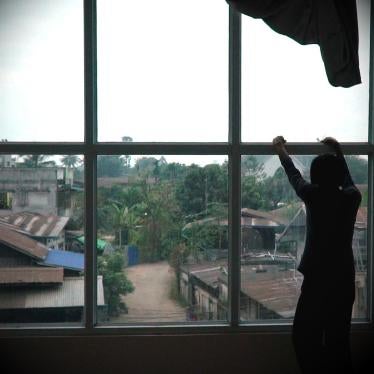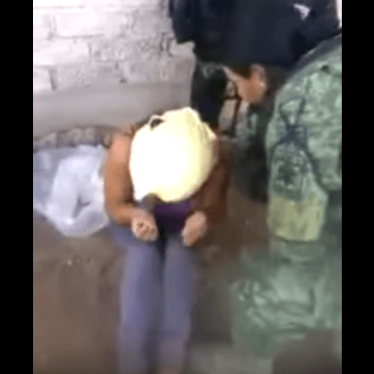- El aumento de los efectos del cambio climático ha desplazado a habitantes de Walande y otras comunidades costeras de las Islas Salomón, poniendo en riesgo sus derechos económicos, sociales y culturales.
- La comunidad de Walande se trasladó de una pequeña isla al territorio continental de Malaita debido al aumento del nivel del mar y la intensificación de las tormentas. Sin embargo, continúan enfrentando amenazas constantes derivadas del cambio climático, la inseguridad en la tenencia de la tierra, el acceso limitado a terrenos y la falta de apoyo adecuado.
- El gobierno de las Islas Salomón debería implementar sus Directrices sobre Reubicación Planificada, asegurando que el apoyo se priorice según las necesidades. Tanto el gobierno como los países de altos ingresos deben aumentar la financiación y la asistencia técnica para garantizar que las comunidades más afectadas puedan reubicarse o permanecer en sus tierras con sus derechos protegidos.
(Honiara) – El aumento del nivel del mar y otros impactos del cambio climático, agravados por la inseguridad en la tenencia de la tierra, el acceso limitado a terrenos y el escaso apoyo gubernamental, están poniendo en riesgo los derechos de la comunidad indígena de Walande en las Islas Salomón, según un informe publicado hoy por Human Rights Watch. A pesar de haber tomado la drástica decisión de abandonar su isla natal para escapar de los efectos del cambio climático, la comunidad sigue en situación de vulnerabilidad.
El informe de 66 páginas, “‘There’s Just No More Land’: Community-led Planned Relocation as Last-resort Adaptation to Sea Level Rise in Solomon Islands” (“‘Ya no queda más tierra’: Reubicación planificada liderada por la comunidad como última opción de adaptación al aumento del nivel del mar en las Islas Salomón”), documenta las razones que llevaron a la comunidad de Walande a tomar la difícil decisión de trasladarse después de décadas intentando adaptarse en su lugar de origen. Además, expone cómo lograron reubicarse sin recibir el apoyo adecuado del gobierno ni de la comunidad internacional y cómo sus derechos económicos, sociales y culturales siguen estando en peligro. Human Rights Watch concluyó que, si bien el gobierno de las Islas Salomón ha tomado medidas importantes para apoyar a las comunidades más afectadas por la crisis climática—como la adopción de las Directrices sobre Reubicación Planificada—, estas aún no se han implementado plenamente.
“La historia de Walande es una advertencia de que las comunidades no pueden enfrentar solas la crisis climática”, afirmó Erica Bower, investigadora sobre desplazamiento climático en Human Rights Watch. “El gobierno de las Islas Salomón tiene la oportunidad de convertirse en un referente global en estrategias de reubicación planificada que respeten los derechos humanos, pero para ello debe implementar de manera urgente sus directrices y garantizar que las comunidades desplazadas por la crisis climática reciban el apoyo necesario”.
Human Rights Watch entrevistó a más de 130 habitantes de Walande y de otras aldeas costeras, así como a funcionarios gubernamentales y expertos. Además, analizó imágenes satelitales, datos sobre ayuda para la adaptación y otros documentos.
Walande es una comunidad de aproximadamente 800 personas ubicada en la costa sur de Malaita, en las Islas Salomón. Hasta mediados de la década de 2010, la comunidad vivía en una pequeña isla frente a la costa. Durante décadas, tras ser golpeadas por ciclones y tormentas, los habitantes reconstruían sus viviendas y se adaptaban en el mismo lugar. Sin embargo, tras las devastadoras mareas “reales” (un término coloquial que hace referencia a las mareas más altas del año) de 2009, toda la comunidad tuvo que trasladarse al territorio continental.
La experiencia de Walande pone de manifiesto los peligros de que el gobierno y los donantes internacionales no brinden el apoyo adecuado a los procesos de reubicación planificada liderados por la comunidad. A pesar de haber solicitado ayuda, los habitantes de Walande tuvieron que financiar y ejecutar su traslado por sus propios medios. Sin embargo, la reubicación solo les proporcionó seguridad a corto plazo: el mar está erosionando los muros de contención en el nuevo asentamiento y destruyendo sus fuentes tradicionales de alimento.
La comunidad dispone de fondos mínimos para protegerse del aumento del nivel del mar, carece de seguridad sobre la tenencia de la tierra en su nueva ubicación y no tiene acceso a terrenos más elevados en el interior. Algunas personas están considerando trasladarse nuevamente. “Buscamos tierras más altas... otra vez”, comentó un miembro de la comunidad.
Las mujeres en Walande enfrentan desafíos particulares, ya que su acceso a la tierra está restringido debido al sistema patriarcal de tenencia de tierras en la provincia. Algunas mujeres aseguraron que líderes comunitarios las presionaron para casarse fuera de Walande como una supuesta medida de adaptación.
La reubicación planificada es una medida de adaptación de último instancia que conlleva riesgos significativos. Su planificación debe respetar los principios de derechos humanos, como el consentimiento informado, e involucrar a las comunidades reubicadas, como la de Walande, en todas las etapas del proceso. El nuevo asentamiento debe garantizar el acceso a derechos económicos, sociales y culturales para toda la comunidad.
El gobierno de las Islas Salomón tiene la obligación, según el derecho internacional, de proteger a las comunidades de los riesgos climáticos previsibles, facilitando medidas de adaptación que respeten los derechos humanos y garanticen la protección de los derechos indígenas, los derechos sobre la tierra consuetudinaria y los derechos de las mujeres. Las Directrices sobre Reubicación Planificada de 2022 establecen un marco sólido en teoría, pero hasta que no se implementen plenamente, las comunidades reubicadas y en proceso de reubicación seguirán expuestas a los efectos del cambio climático y a riesgos para sus derechos humanos.
El gobierno de las Islas Salomón debe implementar de manera integral las directrices, lo que implica desarrollar un plan nacional para identificar las comunidades más expuestas a los riesgos climáticos y priorizar el apoyo según sus necesidades. Asimismo, debe aumentar la financiación para los procesos de reubicación liderados por la comunidad, garantizando que los fondos no solo cubran la reconstrucción de viviendas y la seguridad de las personas, sino también el acceso pleno a derechos fundamentales como la educación, la salud y la preservación del patrimonio cultural.
De acuerdo con el derecho internacional en materia de cambio climático y derechos humanos, los países “desarrollados” tienen la obligación de apoyar la adaptación climática en los países menos desarrollados, como las Islas Salomón. Sin embargo, entre 2011 y 2021, habitantes de las Islas Salomón recibió, en promedio, apenas US$ 20 por año de ayuda extranjera para la adaptación climática.
Algunos países han comenzado a respaldar iniciativas de adaptación lideradas por las comunidades. Australia, por ejemplo, colaboró en la preparación del nuevo asentamiento de Walande. No obstante, Human Rights Watch instó a los donantes internacionales a aumentar de manera significativa la asistencia financiera y técnica para que las Islas Salomón puedan afrontar la crisis climática y para que las comunidades más afectadas, como Walande, puedan adaptarse en su lugar de origen o reubicarse de manera segura, con sus derechos protegidos.
El Grupo Intergubernamental de Expertos sobre el Cambio Climático (IPCC, por sus siglas en inglés) proyecta que “a medida que se intensifiquen los riesgos climáticos, aumentará la necesidad de reubicaciones planificadas”. Todos los países con costas deben anticiparse a este desafío, tomando como referencia experiencias previas de reubicaciones lideradas por comunidades, como la de Walande, y de políticas como las directrices adoptadas por las Islas Salomón.
“El apoyo a las comunidades en la primera línea de la crisis climática es urgente y cada vez se volverá más apremiante”, advirtió Bower. “No podremos afrontar estos desafíos, cada vez mayores, sin aplicar políticas centradas en los derechos humanos”.









